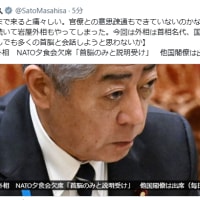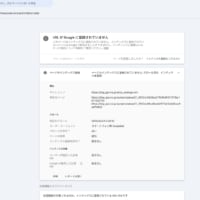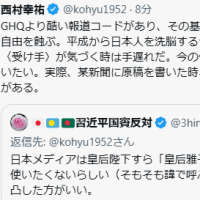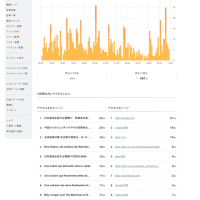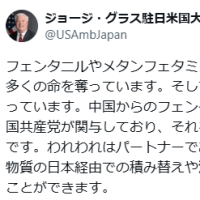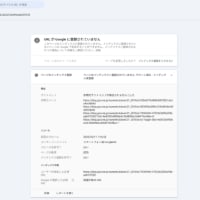Japan had one of the best insightful politicians in the postwar era.
That is why the anti-Japanese media, their followers, and anti-Japanese politicians have been relentlessly attacking him to destroy him.
China and the Korean peninsula gloatingly watched him, the only two anti-Japanese propaganda states worldwide.
When he stated the perfectly natural fact that "the Taiwan contingency is a Japan contingency," a fact that many politicians other than himself and those mentioned above had kept their mouths shut in deference to China, even an elementary school-level brain could understand that Xi Jinping, who has made the invasion of Taiwan an essential part of completing his dictatorship, would not sit idly by and watch. He would not have watched quietly.
It is an obvious fact that Xi has been eliminating, by any means necessary, anyone he deems unsuitable for his position.
For example, not a single one or two people have died in suspicious suicides.
A dictatorship is not only a nation of people who follow the dictator's will but also a nation of satellites that follow the dictator's will.
The following is from Ms. Yoshiko Sakurai's regular column in the Sankei Shimbun on August 1.
This article also proves that she is a national treasure as defined by Saicho, the supreme national treasure.
The emphasis in the text other than the headline is mine.
Japanese People Must Take Over Abe's Warning Bells
Former Prime Minister Shinzo Abe was motivated by a strong sense of crisis.
On December 1, 2011, he gave an online lecture at a meeting organized by a Taiwanese research institute, saying, "A Taiwan contingency is also a Japan contingency, i.e., a Japan-U.S. alliance contingency. President Xi Jinping should not fail to recognize this.
In a speech in Fukui Prefecture on April 9, he suggested that defense spending should be increased to 2% of gross domestic product (GDP), as there is growing concern that Russia's invasion of Ukraine could trigger China's invasion of Taiwan. 2% of gross domestic product (GDP).
In a May 20 Internet program, "Discourse T.V.," he said, "I could not say this when I was prime minister, but I must say it now. The Self-Defense Forces do not have the capability to take over the war. From machine gun rounds to the missile defense (interceptor missile) 'SM3,' it is not enough," he revealed.
Mr. Abe's severe warning indicates a deep crisis in Japan's national defense system.
Although Mr. Abe stepped down from the prime minister's post due to illness, his more vigorous political activities from last year until his death by a bullet in July of this year may have been due to his awareness of the impending Taiwan emergency, which could have a significant impact on the fate of Japan.
Last November, Mr. Abe noted that Mr. Xi had passed a "historical resolution" for the third time in the history of the Communist Party of China (CPC) at the Sixth Session of the 19th Central Committee (Six-China Plenary Session), creating a system under which he would remain president for life, just as Mao Zedong had done.
Experts believe that Mr. Xi's power base is solid, as he has purged his political opponents one after another despite the many problems in the country.
If Xi survives this fall's Communist Party Congress and begins his third term as president, he will have no one to fear.
He can dictate and coerce domestically and internationally without any restrictions.
He will uphold the great restoration of the Chinese nation and try to make the world conform to the values of the Chinese empire.
The annexation of Taiwan is a prerequisite for Mr. Xi to obtain such an absolute leadership position.
Mr. Abe saw Mr. Xi's invasion of Taiwan not in the distant future but soon (political journalist Wento Ishibashi).
Can our country protect both Taiwan and Japan at that time?
The current situation is impossible, which is why Mr. Abe has sounded the alarm.
More fundamentally, Mr. Abe advocated breaking away from the postwar regime, saying, "Let go of the spirit of dependence on the U.S." and "Show Japan's mettle," meaning that Japan must first demonstrate its unique capabilities in security education and the home.
He called for the revision of the Constitution, the source of the postwar regime.
Meanwhile, Prime Minister Fumio Kishida took over the line of Abe and former Prime Minister Yoshihide Suga and pledged to U.S. President Joe Biden a "substantial increase in defense spending.
He condemned Russian President Vladimir Putin's war of aggression at about the same time as European nations.
With a series of quick reactions, Prime Minister Kishida won the confidence of the North Atlantic Treaty Organization (NATO) countries. In late June, He was the first Japanese prime minister to be invited to a NATO summit.
At the North Atlantic Treaty Organization (NATO) summit, he decided on a massive military buildup to counter Russia and took a hard-line stance, defining China as a "regime challenges.
If China invades Taiwan, NATO will undoubtedly become a significant international deterrent to China.
NATO's stance probably reflects trust in the Fumio Kishida administration, which was quick to cooperate with NATO in criticizing Russia.
Nevertheless, why has Prime Minister Kishida still not declared "2% defense spending"? It is in Japan's national interest to express it as the nation's will and achieve it as soon as possible, not in five years, but in one or two years.
U.S. Assistant Secretary of State Eli Rattner spoke in detail regarding the Chinese threat at the Center for Strategic and International Studies (CSIS).
Over the past five years, since around 2017, Chinese People's Liberation Army (PLA) vessels and aircraft have begun attempting "serious and dangerous abnormal approaches" to U.S. forces and their allies.
These attempts have increased abnormally in recent months, with the number of damages reportedly reaching dozens of times.
For example, on May 26 of this year, a P8A patrol aircraft of the Royal Australian Air Force, which was engaged in routine surveillance activities in the South China Sea, was attacked by a PL A fighter jet, "Eagle 16" abnormally approached the aircraft.
The Chinese aircraft released aluminum fragments to jam radar and firebombs to guide the other aircraft's missiles, and the P8A's engine sucked in some of the aluminum fragments.
The PLA's abnormal behavior has not ceased, and the series of outbursts, which seem to aim at changing the status quo, have been analyzed as arising from the overall strategy of the Chinese government, not from the adventurism of individual military personnel.
In 2005, Prime Minister Shinzo Abe launched the "Free and Open Indo-Pacific Strategy" (FOIP), which U.S. President Trump adopted as the U.S. strategy.
European countries also agreed, and the FOIP became the foundation of the Free World Grand Strategy.
China does not want "free and open" seas.
It has begun to argue that the Taiwan Strait is not international waters.
They want to make the broad waters of the Indo-Pacific Ocean a "closed" sealed by China.
To this end, they may be looking to see how far the Chinese approach of controlling by force will go.
After this fall, Chinese President Xi Jinping's power base will become even more solid, and he will be more unilateral and hard-line than ever before.
The extraordinary pressure the PLA Air Force is now exerting on other countries' militaries will surely spill over to the sea.
Both U.S.-China and Japan-China diplomacy are like a battlefield without weapons on the ground.
The international situation will unfold much faster and more dramatically than anticipated.
The issue of U.S. Speaker of the House Nancy Pelosi's visit to Taiwan will continue to smolder unless the U.S. side stops the stay at the behest of China.
Xi's North Korea-like threat to "play with fire or you will burn to death" on the Taiwan issue is gouging China's authoritarian constitution.
The confrontation between the U.S. and China is likely to intensify.
Japan is in a state of emergency.
There is no time to spare.
Prime Minister Kishida should take over the strong sense of crisis that the late Mr. Abe had and strengthen the foundations of the Japanese nation.
Without achieving 2% defense spending and constitutional reform as soon as possible, Japan is truly in danger.
That is why the anti-Japanese media, their followers, and anti-Japanese politicians have been relentlessly attacking him to destroy him.
China and the Korean peninsula gloatingly watched him, the only two anti-Japanese propaganda states worldwide.
When he stated the perfectly natural fact that "the Taiwan contingency is a Japan contingency," a fact that many politicians other than himself and those mentioned above had kept their mouths shut in deference to China, even an elementary school-level brain could understand that Xi Jinping, who has made the invasion of Taiwan an essential part of completing his dictatorship, would not sit idly by and watch. He would not have watched quietly.
It is an obvious fact that Xi has been eliminating, by any means necessary, anyone he deems unsuitable for his position.
For example, not a single one or two people have died in suspicious suicides.
A dictatorship is not only a nation of people who follow the dictator's will but also a nation of satellites that follow the dictator's will.
The following is from Ms. Yoshiko Sakurai's regular column in the Sankei Shimbun on August 1.
This article also proves that she is a national treasure as defined by Saicho, the supreme national treasure.
The emphasis in the text other than the headline is mine.
Japanese People Must Take Over Abe's Warning Bells
Former Prime Minister Shinzo Abe was motivated by a strong sense of crisis.
On December 1, 2011, he gave an online lecture at a meeting organized by a Taiwanese research institute, saying, "A Taiwan contingency is also a Japan contingency, i.e., a Japan-U.S. alliance contingency. President Xi Jinping should not fail to recognize this.
In a speech in Fukui Prefecture on April 9, he suggested that defense spending should be increased to 2% of gross domestic product (GDP), as there is growing concern that Russia's invasion of Ukraine could trigger China's invasion of Taiwan. 2% of gross domestic product (GDP).
In a May 20 Internet program, "Discourse T.V.," he said, "I could not say this when I was prime minister, but I must say it now. The Self-Defense Forces do not have the capability to take over the war. From machine gun rounds to the missile defense (interceptor missile) 'SM3,' it is not enough," he revealed.
Mr. Abe's severe warning indicates a deep crisis in Japan's national defense system.
Although Mr. Abe stepped down from the prime minister's post due to illness, his more vigorous political activities from last year until his death by a bullet in July of this year may have been due to his awareness of the impending Taiwan emergency, which could have a significant impact on the fate of Japan.
Last November, Mr. Abe noted that Mr. Xi had passed a "historical resolution" for the third time in the history of the Communist Party of China (CPC) at the Sixth Session of the 19th Central Committee (Six-China Plenary Session), creating a system under which he would remain president for life, just as Mao Zedong had done.
Experts believe that Mr. Xi's power base is solid, as he has purged his political opponents one after another despite the many problems in the country.
If Xi survives this fall's Communist Party Congress and begins his third term as president, he will have no one to fear.
He can dictate and coerce domestically and internationally without any restrictions.
He will uphold the great restoration of the Chinese nation and try to make the world conform to the values of the Chinese empire.
The annexation of Taiwan is a prerequisite for Mr. Xi to obtain such an absolute leadership position.
Mr. Abe saw Mr. Xi's invasion of Taiwan not in the distant future but soon (political journalist Wento Ishibashi).
Can our country protect both Taiwan and Japan at that time?
The current situation is impossible, which is why Mr. Abe has sounded the alarm.
More fundamentally, Mr. Abe advocated breaking away from the postwar regime, saying, "Let go of the spirit of dependence on the U.S." and "Show Japan's mettle," meaning that Japan must first demonstrate its unique capabilities in security education and the home.
He called for the revision of the Constitution, the source of the postwar regime.
Meanwhile, Prime Minister Fumio Kishida took over the line of Abe and former Prime Minister Yoshihide Suga and pledged to U.S. President Joe Biden a "substantial increase in defense spending.
He condemned Russian President Vladimir Putin's war of aggression at about the same time as European nations.
With a series of quick reactions, Prime Minister Kishida won the confidence of the North Atlantic Treaty Organization (NATO) countries. In late June, He was the first Japanese prime minister to be invited to a NATO summit.
At the North Atlantic Treaty Organization (NATO) summit, he decided on a massive military buildup to counter Russia and took a hard-line stance, defining China as a "regime challenges.
If China invades Taiwan, NATO will undoubtedly become a significant international deterrent to China.
NATO's stance probably reflects trust in the Fumio Kishida administration, which was quick to cooperate with NATO in criticizing Russia.
Nevertheless, why has Prime Minister Kishida still not declared "2% defense spending"? It is in Japan's national interest to express it as the nation's will and achieve it as soon as possible, not in five years, but in one or two years.
U.S. Assistant Secretary of State Eli Rattner spoke in detail regarding the Chinese threat at the Center for Strategic and International Studies (CSIS).
Over the past five years, since around 2017, Chinese People's Liberation Army (PLA) vessels and aircraft have begun attempting "serious and dangerous abnormal approaches" to U.S. forces and their allies.
These attempts have increased abnormally in recent months, with the number of damages reportedly reaching dozens of times.
For example, on May 26 of this year, a P8A patrol aircraft of the Royal Australian Air Force, which was engaged in routine surveillance activities in the South China Sea, was attacked by a PL A fighter jet, "Eagle 16" abnormally approached the aircraft.
The Chinese aircraft released aluminum fragments to jam radar and firebombs to guide the other aircraft's missiles, and the P8A's engine sucked in some of the aluminum fragments.
The PLA's abnormal behavior has not ceased, and the series of outbursts, which seem to aim at changing the status quo, have been analyzed as arising from the overall strategy of the Chinese government, not from the adventurism of individual military personnel.
In 2005, Prime Minister Shinzo Abe launched the "Free and Open Indo-Pacific Strategy" (FOIP), which U.S. President Trump adopted as the U.S. strategy.
European countries also agreed, and the FOIP became the foundation of the Free World Grand Strategy.
China does not want "free and open" seas.
It has begun to argue that the Taiwan Strait is not international waters.
They want to make the broad waters of the Indo-Pacific Ocean a "closed" sealed by China.
To this end, they may be looking to see how far the Chinese approach of controlling by force will go.
After this fall, Chinese President Xi Jinping's power base will become even more solid, and he will be more unilateral and hard-line than ever before.
The extraordinary pressure the PLA Air Force is now exerting on other countries' militaries will surely spill over to the sea.
Both U.S.-China and Japan-China diplomacy are like a battlefield without weapons on the ground.
The international situation will unfold much faster and more dramatically than anticipated.
The issue of U.S. Speaker of the House Nancy Pelosi's visit to Taiwan will continue to smolder unless the U.S. side stops the stay at the behest of China.
Xi's North Korea-like threat to "play with fire or you will burn to death" on the Taiwan issue is gouging China's authoritarian constitution.
The confrontation between the U.S. and China is likely to intensify.
Japan is in a state of emergency.
There is no time to spare.
Prime Minister Kishida should take over the strong sense of crisis that the late Mr. Abe had and strengthen the foundations of the Japanese nation.
Without achieving 2% defense spending and constitutional reform as soon as possible, Japan is truly in danger.











